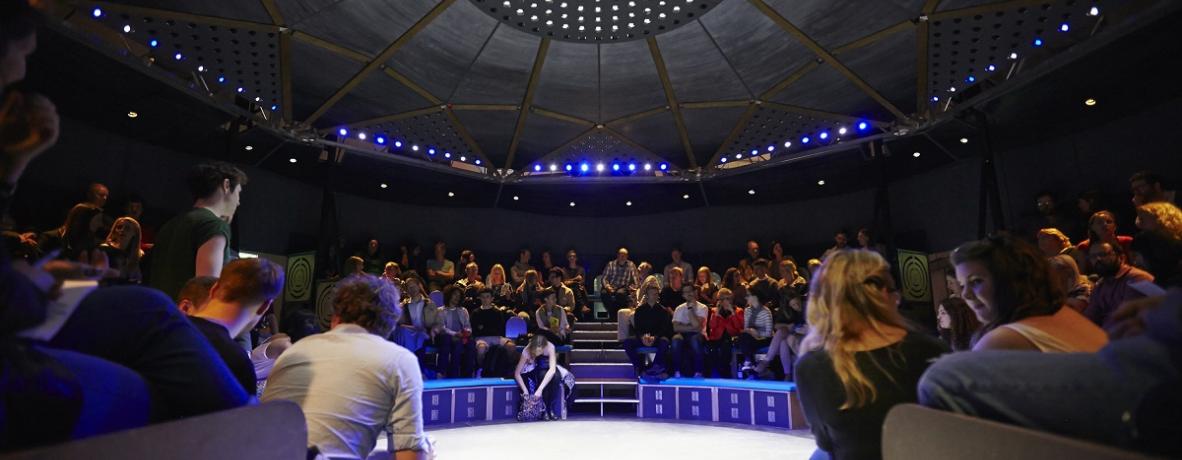 (1 / 5)
(1 / 5)
Turbines by Sarah McDonald Hughes follows six students (aged around 15-16) in a unit-classroom as they deal with the stabbing of a schoolmate. This leads to Mia stabbing her teacher in the first scene as the play attempts to explain why this happened, exploring who these young people are.
The play suffers from the use of stereotypical characters who possess little depth and writing that feels lazy. As though students are chucked in a unit and that will justify the stabbing, but it doesn’t. Even within their backstories, their presence in the unit is not justified.
As it is, the play feels it would be more interesting placed in a standard classroom as the play currently comes across as a series of events that are mostly irrelevant or insignificant, particularly given the moral protection of the unit.
The flow is constantly interrupted, and it moves too fast without allowing time to explore the characters. There are a few breaks that offer potential such as Tina’s boyfriend breaking up with her or a flashback to the start of Mia and Grace’s early friendship. But even these scenes show very little emotional intrigue.
There is no overriding story, really, besides the two stabbings. The backstories cover most of the play, but these are stereotypical. Parents who argue, a young pregnancy, an ill mother, and so on. These backstories are not unique, offer little significance and just when you’re expecting something to tie it all together, they look at some turbines, say they feel calm, and nothing happens.
Moving onto the turbines, the title of the play and the key piece of symbolism provided. Trying my hardest to drag something out of this, I would say that the turbines are meant to represent serenity and persistence in a tough environment. A symbol that allows the students to express. The rotation of the blades also possibly referring back to the cyclical nature of knife crime. The symbolism is somewhat tacked in and unclear, with potential it’s just not reaching.
Turbines explores multiple possibilities that can happen when the major event, the stabbing, occurs and explores how that might affect their lives differently. It’s also unclear which of these is the ending or if the writer wants there to be one specific ending. Perhaps not an issue for where this piece was imagined to be but given that it appears to try to question why this stabbing might occur, the lack of a definitive ending is a problem.
I can see where this play goes wrong in the writing process, as it has a singular focus at its core and fitting that to a cast of seven is hard. It centres around Mia and everyone else is basically irrelevant. And if that is the aim, then why bother with 90% of the rest of the play? There is potential there for a good play about Mia. But it needs expanding, focusing and lots of cutting.
I just struggle to see how a play produced in collaboration with Paines Plough could be quite this underdeveloped. My guess is that the writer wasn’t afforded the time or support necessary for this piece to succeed. I don’t think you can pin the play’s failures solely on such a talented and promising writer.
Emily Ling Williams direction just falls a little flat. There are attempts at characterisation through the acting, some of which work, some don’t. The tone and pace are not handled particularly well, however this is quite hard as the story beats are all over the place. It’s a tough play to direct, but Williams stumbles to raise the bar for the production.
Rocky Hood’s lighting works well, very understated, but is one of few positives from this production. The sound design from Jack Lancelot Stewart is fine. It’s nothing exceptional and sometimes intruding, but decent overall.
Clare Johnson’s set is a little clunky and often gets in the way, although does a good job of establishing location. The fans, representing wind turbines, just look tacky and don’t work.
The performances from the cast of seven are all decent. But really, most of the actors don’t have much to play with. There are clearly attempts at characterisation made by the actors with the director. Amesh Edireweera’s mannerisms as Liam, Finnian Garbutt’s boyish immaturity as Reece and Nina Bloomgarden’s grace as Grace all stand out as expansions on the script.
Unfortunately, the school teacher, portrayed by Lilly Tukur, Jack (Harry Heap) and Tina (Julie Lamberton) are all pretty much unsavable. The performances are good for the most part, given what they had, but they really deserve better.
Abbie Hern stands out as Mia. Her character has the most substance and is the most explored. Hern rises to this and delivers a great performance which is one of few shining lights in this production.
Turbines examines young people and their actions in what is an underwhelming production that can’t be saved by its strong cast.
Turbines performed at The Bute Theatre, Royal Welsh College of Music and Drama
19 – 21 March 2019 in Cardiff
Transferring to The Gate Theatre, London, 2 – 5 April
Written by Sarah McDonald Hughes
Directed by Emily Ling Williams
In Collaboration with Paines Plough
As part of RWCMD’s ‘NEW’ Season
Starring:
Abbie Hern as Mia
Nina Bloomgarden as Grace
Finnian Garbutt as Reece
Amesh Edireweera as Liam
Julie Lamberton as Tina
Harry Heap as Jack
Lilly Tukur as School Teacher
Production Team:
Set & Costume Design: Clare Johnson
Lighting Design: Rocky Hood
Sound Designer: Jack Lancelot Stewart
Assistant Production Manager: Alexandra Drescher-Elphick
Stage Manager: Jessica Forella
Deputy Stage Manager: Cara-Megan Rees
Assistant Stage Manager: Amy Hales
Design Assistant: Rachel Merritt
Technicians: Ella Cunnison, Kitty Dunning, Jamie Holden and Paul Kaiba
Venue Technician: Evie Oliver
Supervisors: Kristy Bowers, Rob Clarke and Laura Martin


 (4 / 5)
(4 / 5)








